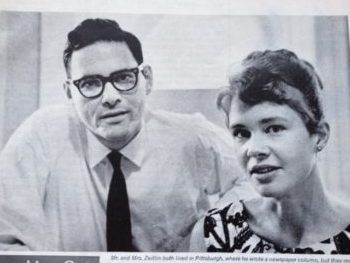The Peace Corps isn’t doing its job
Is the Peace Corps a Failure?
That’s the title on the cover of a front-page story in the January 1, 1966 issue of the Saturday Evening Post. It was written by RPCVs Arnold Zeitlin and Marian Zeitlin. It was written after his book To the Peace Corps With Love was published in 1965.
Marian and Arnold were from Pittsburgh. They met in Peace Corps Training and were married in Ghana. They served with the first Peace Corps project–teachers–in Ghana from 1961 to 1963.
This two-page article for the Saturday Evening Post appeared in the Post’s “Speaking Out”column where readers could have their say on issues of their own. It was entitled:
The Peace Corps isn’t doing its job
Arnold and Marian wrote in the second paragraph of their article:
We believe that the Corps has sold the public a bill of goods. We believe that it is failing to fulfill its promises, and that most of the popular ideas about it are false. The 1961executive order that created the Corps declared that it was to offer developing countries a pool of trained Americans “to help meet their urgent needs for skilled manpower.” In fact, the Corps provides no such manpower pool. Some projects never get started because the Corps lacks skilled people to staff them.
The Zeitlins go onto blame the problem on the Peace Corps inability to attract the best skilled Americans to join the agency, blaming Sarge Shriver by name. They write:
A root of the manpower failure is the Corps’ interest in maintaining the picture it originally sold–thousands of young Americans who abandon their affluent society to work for their deprived brothers overseas. This picture, gallant and glamorous, was deemed necessary to convince Congress and the public, and a fetching amateurism is one of its essentials. The Peace Corps never has seriously tried to attract seasoned, professional people. They might help a country like Ghana, but they don’t fit into Shriver’s plans.
The young couple go on in their “Speaking Out” article to make other points.
- Our experience is that the Peace Corps will have small effect on foreign attitudes toward this country. In Ghana, the Corps’s program was considered a success, but U.S.-Ghanaian relations steadily worsened during our stay.
- The genuine measure of the success of the Peace Corps is how much it lifts living standards in countries where it works. So far, the success lags far behind the claims and promises.
- Some Corps assignments do involve sacrifice. Ours did not; so pretenses had to be invented.
- The Peace Corps may have to bend its image and abandon some prejudices to attract more seasoned, skilled persons.
- The Peace Corps is here to stay. It doesn’t need a bill of goods to convince people of its value. It should stop spreading illusions, face the facts and get on with the job for which it was created.
The couple then describe how the Ghana Staff would make sure visiting congressmen and women would have “a taste of the so-called hardship” that PCVs were experiencing. “They were stuffed into Jeeps and driven a couple of hundred spine-jarring miles over dirt roads to a town called Half-Assini. They were warned not to drink the local water or eat the local foods. They were told the road was closed by rains nine months of the year (it wasn’t). By the time they were led, shaken, weary and hungry, to the digs of a volunteer couple in the town, they were easily convinced anything was hardship.”
Mr. and Mrs. Zeitlin do write, however, in their article: “We are still committed to the Corps’s ideal and purpose, but they cannot be realized unless the Corps reforms some methods and dispenses with some myths.”
****
Next year, the Peace Corps will celebrate 60 years of service. A few Peace Corps Directors have attempted versions of what Arnold and Marian wrote about but always the agency has returned to what Shriver and the other founders saw as the answer. And, therefore, the Peace Corps has lasted and been a continued success in nations all over the world. Unfortunately, the marriage of Marian and Arnold, first celebrated in their host country, did not survive the years that followed in America.


There is one group of trained professionals which have consistently been Volunteers, from 1961 to the present. That group consists of Registered Nurses. Peace Corps has not maintained much record, let alone a complete history, of their service.
Indeed, in 2012, when Dr. Kerry described the partnership between Peace Corps and her Global Seed Medical organization, she said, in an NPR interview that Peace Corps had never sent doctors and nurses overseas to teach.
The issues addressed by the Zeitlins are relevant today, I think. However, the circumstances in which Peace Corps operates have changed much during the decades since. The assassination of President Kennedy and its impact on Peace Corps has never been addressed. Sargent Shriver leaving to head up President Johnson’s War on Poverty and work only part-time as Peace Corps Director was critical and has not been adequately studied. Plus, the Vietnam Draft and the impact on Peace Corps recruitment is also a factor.
Just like one can never step in the same river, twice, Peace Corps is an umbrella name for multiple administrations. All of whom addressed the First Goal in a multitude of ways.
In my opinion, the Third Goal has been the most successful and it belongs almost entirely to the independent work of the RPCV community.
This was not my experience at all. I can’t speak to today, but when I served along with several hundred other teachers, we made a difference by giving our students a chance at an education they could use to lift themselves out of abject poverty. Three of my students won four years of full tuition, room & board scholarships to the best prep school in the capital of Addis Ababa.
Most of us lived in very primitive conditions.
The idea that the Peace Corps would attract seasoned professionals already established in their lives and careers (while it did happen on occasion) is naive to use a kind term.
How strange that I don’t recall this article! Now, not at all.
Seems now looking back to have been something that might be addressed by Marian and Arnold who are still around, but older. He is 88. She closer to my age that is 83 this March.
Thinking also of an old verse that is just drifting in: ‘THE MOVING FINGER WRITES, AND HAVING WRIT MOVES ON. AND NOT ALL YOU PIETY NOR WIT CAN MOVE IT BACK TO CANCEL HALF A LINE. (remembered closely if not exactly how Fitzgerald translated Omar K’s lines.)
Here’s a an old poem of min about an old story: Edward Mycue’s TELLING THE ODYSSEY
Subdued stony seas far-off straggling
assembled sailors awakened from steam-
ing debris of lost time at midnight,
returned to thresholds to ancient
Ithakan ways searching, wisps of Circe
hiding in their hair remembering stark
desolation of illimitable worlds
destinations circumnavigating circumstance,
horizons swirling in migratory constant
chaos. Sail-sightings, reefs, abandon-
ings, day-doggedness, successive
repulsions and desires, showers, fore-
shores, fresh food, trifles, masks of
crude cleverness, acid wares – all
congealed massively into mind-shattering
mosaics. Like a magic cultural increment
theirs became marvelous oral histories
of impulses shrouded in mists, of
Helenized meridians whetted by shivering
shifting corridors of waves — live
novel tales confided in white wandering
versions illuminated with isolated ape
skulls, with awkward wrath-winged creatures
long since vanished, of dud plans, wiles,
vast swamps of space, of flights from
worship and from warning. They told of
deductions, tainted motives, strange and
secret islands, Cos gossamer, deaths,
the bleeding amaranthe, the stimulating
siege of Troy. As they retraversed these
tropics, much must have been transmuted.
At how many firesides, how many families
manned again those bottoms ballasting
whole evenings with the waitings and re-
tracings, wild rituals? How was the
bombast balanced? Who heard it out with myth-
invoking mind? Mitigating fears with awe
what salted tongues and with what shrugging,
while eyes widened, embellished further
the way they passed it on through Homer?
And in late, hot vatic evening hours
which of them recalling ruminated: how
they had not listened to the warning so
that they dwelt in the strong vessel
of homelessness so long seeking the un-
discovered world? Of all the voyagers
in Ithaka who told their odyssey, who
was it who sat then guessing partially
wondering into dawn.
© Copyright Edward Mycue
I served in the first peace corps which trained for Colombia at Rutgers in June 1961. While I generally agreed then that we were not as prepared either in backgroung or training for what we met in the backwoods of Colombia, we brought to the underdeveloped world a great deal of hope that America, under Kennedy then, really cared and showed our devotedness to pitch in to help uplift their lives when it was so oppressive. We created and crafted our way through to accomplish a small amount and start the ball rolling, whether in getting their government to support the campesino or in self-help. Today in the Peace Corps it appears they are lining up more with projects studied and financed by USAID and local NGO’s so that it is more meaningful and more targeted work then at the beginning. It was worth it though getting college grads and those with language and some of the critical skills in the beginning to ensure that Peace Corps got off the ground in a big way through generalists or it may have dried up for lack of specialized skills and it wouldn’t be with us today. What Peace Corps did in a big way was to pave the way for so many former volunteers to devote their lives to working overseas and sensitized us to immigrants and poverty in our country. Dan Wemhoff Colombia I
For me, the greatest value of the Peace Corps was, and continues to be the opportunity for people in the host countries to be exposed to Americans of all stripes and vice versa. It is consciousness expansion par excellence on both sides and helps break down a multitude of stereotypes, misconceptions and just plain ignorance about each other.
“ignorance” “misconception” “stereotype” sum up the dimming/ swimming behind eyes that are there to see and not to look away.
We who were once traveling companions exploring are now long ago memories. Once sectarian barriers enslaved us, and now it seems will do so again as there is now so much it appears again to fight about, to pay out and to pay back under new night skies.
“The seas dry, the rock melt in the sun” — Kathleen Raine, THE HOLLOW HILL
The infamous words of Lenny Bruce come to mind.